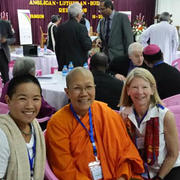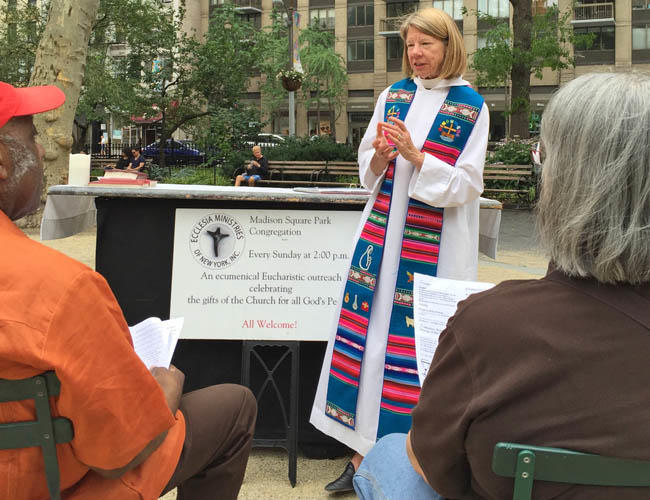
It was the mid-1970s and, after one year at Harvard Divinity School, Margaret Rose still had not found her calling. She had a passion for theology and for social justice, but wasn’t convinced that a career as a religious leader was for her, so she went for advice to Krister Stendahl, then Dean of HDS.
Stendahl encouraged Rose, as part of her discernment process, to spend a semester abroad at the Ecumenical Institute in Bossey, Switzerland—and promised her degree credit if she did. She agreed and the experience has shaped her life ever since.
“I lived in community with 65 Christians from 35 different countries and many different denominations,” Rose remembers. “It didn’t take but two days until we fought over everything: liturgy, daily life, what you could wear in public, and, most particularly, politics. But we came together in worship and prayer. I saw for the first time the sacramental aspect of leadership as a way to do peacebuilding and social justice work. It was life-changing.”
More than 40 years later, the Rev. Margaret Rose, MDiv ’79, brings people of faith together as the Ecumenical and Interreligious Deputy to the Presiding Bishop of the Episcopal Church. In this role, she works not only to build bridges between traditions and denominations, but also between the world, so often rife with conflict, and internal spiritual longing.
“We need another way in that helps us to know one another as human beings,” she says of rebuilding community life in a time of division. “Worship is one of those ways. Not prayer and private religion, but prayer and public religion.”
Religion was central to public life in the rural Georgia town of Carrollton where Rose grew up in the 1960s. She attended a small Episcopal church where questions were encouraged, as was the spirit of ecumenism. Her family sat in the second row of pews. In the first row were the church’s few African American congregants. Rose jokes that “From my child’s perspective, the church was 50 percent black,” but she was keenly aware of the racial segregation that was still the norm in the American South at the time.
“I wouldn’t call our priest an activist, but it was very clear where he stood on questions of racial justice,” Rose says. “In my own family, I remember my father’s frustration for the African Americans who drove trucks for his company. If there was a storm, they couldn’t stop at a segregated motel. I remember how angry that made him. There was a realization of the injustice.”
Rose went north to attend Wellesley College. “I wanted to go somewhere it snowed,” she says. There she majored in religion and biblical studies and spent a year in France, where she fell in love with the country and its culture. After graduation, she was offered a Rockefeller Fellowship to attend HDS and to “consider the prospect of ordination.” She wanted to continue her studies, so she decided to come to divinity school even though she was at best ambivalent about a career in the church.
The early 1970s were an exciting time to be at HDS. The School’s field education program enabled Rose to have a direct impact in the local community, where she worked at a shelter for battered women. Faculty were opening up to feminist and liberation theology. The range of faiths and denominations at the School made it a remarkably diverse place, even then.
“I loved being in the HDS community,” Rose says. “It helped me to understand myself as a Christian in the context of a multireligious world. The School provided the tools for engaging with that question and for connecting academic knowledge with my understanding of Jesus in my own life.”

After her experience at the Ecumenical Institute, Rose put herself on the ordination path and became part of an early generation of women priests in the Episcopal Church. She served in Massachusetts for a time, and then returned home to Georgia as rector of St. Dunstan’s in Atlanta. As part of the Industrial Areas Foundation community organizing project, Rose fostered a relationship with the predominantly black African Methodist Episcopal church on the other side of town. There, too, she found that religion could provide “a way in” for two communities with different experiences and interests.
“As white liberals, we figured we definitely needed to care about people in the inner city,” Rose says. “But the folks at the AME church pretty much laughed at what we thought was important. Once we had worshiped together—and by that I mean done foot-washing on Maundy Thursday—the fact that the white people on the north side really needed sidewalks became a real issue for African Americans on the other side of town.”
Rose spent 20 years as a parish priest before becoming director of women’s ministries—a position that enabled her to advocate for women both inside and outside the church—and then co-director of Mission. Now, as the presiding bishop’s deputy for ecumenical and interreligious relations, Rose fosters “ecumenical and interfaith dialogue and cooperation with other Christian communions and religious traditions”—as she did at the 2013 assembly of the World Council of Churches in the Republic of Korea.
“God is much bigger than our own definitions,” Rose said at the gathering. “Ecumenism is about living as one member of the household of God, claiming who we are in contrast to others and in the context of God’s much larger mission, which requires all of us to be engaged.”
Today, Rose says that she’s concerned not only about the gap in understanding between different traditions and denominations, but also between the secular and the sacred. As someone who grew up in rural America’s “Bible belt” and who has spent much of her life working for social justice in the inner city, Rose says that Northeast elites and people in the heartland both have much to learn about one another.
“We say secular liberal and religious right, as though those are the only two things there are,” she says. “There are plenty of people in the Deep South who hold positions with which I strongly disagree, but I understand why they do, and they are far more nuanced than people in the Northeast give them credit for. On the other hand, my adult daughters don’t attend church regularly, but they would defend it to the last dime as an institution that pushes us toward social justice.”
So how to cultivate a sense of connection and community when congregational worship isn’t necessarily an option? Rose, who, along with being a priest associate at the Church of the Heavenly Rest, also leads services at the chapel of the church’s central offices in New York, advocates a little guerilla spirituality.
“I decided we would do this service called ‘chalking the door,’ ” she explains. “We climbed up on a ladder and on the lintel of the door we wrote the year and the initials of the three wise men—CMB—which are also the initials for ‘Christ, bless this house.’ We asked that each of us might use the gifts we have for engaging other people and that all who come into this house might be blessed. That includes the consulate for Haiti and for Lesotho. It includes the Ad Council, as well as our church offices. Because I think that sometimes you have to do things without asking permission. Bless them anyway!”
—by Paul Massari
